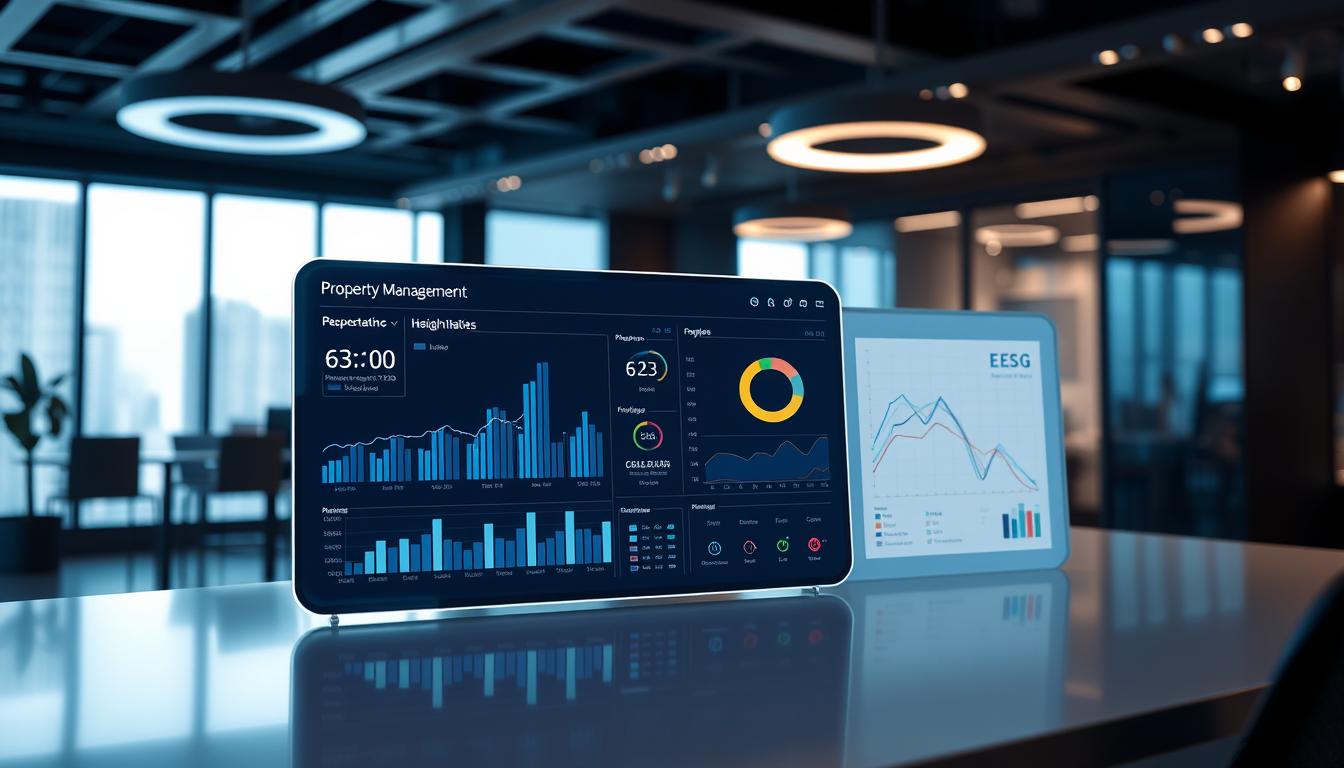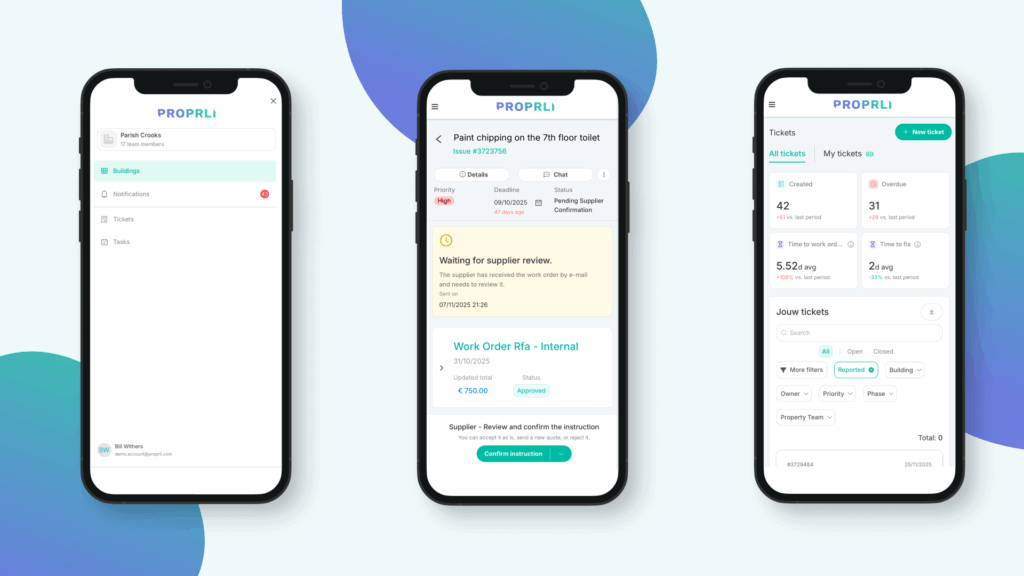In today’s fast-paced real estate world, property management software is key for technical real estate managers. It helps them navigate EU compliance and ESG goals. Proptech solutions are making properties safer, smarter, and more efficient. They also meet strict regulatory standards.
The use of proptech in real estate is not just a trend; it’s essential. It allows for real-time adjustments, improves tenant experiences, and reduces operational costs. With a focus on sustainability and social responsibility, property managers must use innovative technologies. This is to meet ESG regulations, attract investors, and preserve property value over time.
Proptech’s advanced solutions are crucial for the industry’s move towards sustainability and compliance. Technologies like AI, IoT, and blockchain are used in property management software. They enforce compliance and help technical asset managers enhance ESG compliance in real estate investments. Smart building technologies, in particular, are changing the game. They focus on energy efficiency, carbon emissions, and indoor air quality.
Key Takeaways
- Proptech is essential for technical asset managers to meet EU compliance requirements and ESG goals
- Property management software enables real-time adjustments, enhances tenant experiences, and supports operational costs
- Adherence to ESG regulations is crucial for attracting investors and maintaining a property’s long-term value
- Proptech solutions enforce compliance measures by leveraging AI, IoT, and blockchain technologies
- Smart building technologies are transforming regulatory compliance in real estate, covering energy efficiency, carbon emissions, and indoor air quality
The Importance of Proptech in Meeting Real Estate Compliance Standards
Proptech, or property technology, has become essential for real estate professionals to adhere to changing compliance standards. The global proptech market, valued at $33.57 billion in 2023, is expected to reach nearly $90 billion by 2032. This growth underscores the technology’s enduring presence. Proptech solutions, like smart building technologies, help real estate managers track and manage ESG metrics efficiently. These include energy efficiency, carbon emissions, and indoor air quality.
The adoption of proptech is driven by several factors. These include rising costs, increased competition, shifting consumer expectations, rapid technological advancements, and growing environmental concerns. A 2022 CBRE survey found that 76% of European property investors are focusing more on integrating energy and ESG strategies through proptech to boost profitability.
| Proptech Benefit | Impact |
|---|---|
| Increased productivity | Allows more informed decisions in less time |
| Improved communication | Real-time data analysis and reporting tools |
| Single source of truth | Centralizes property-related data, ensuring consistency and accuracy |
| Asset tracking | Identifies asset locations and conditions for effective management |
| Contractor management | Ensures quality work delivery, tracks project progress, and manages invoices |
The role of proptech in meeting real estate compliance standards is critical. The built environment is responsible for around 40% of global energy-related carbon emissions. This highlights the urgent need for decarbonization strategies in the commercial real estate sector. Proptech tools analyze data and manage risks at an advanced level. They promote environmentally sustainable operations and meet investor demands for sustainable, compliant real estate projects. By using proptech solutions, real estate professionals can navigate the complex regulatory landscape. This ensures the long-term viability and profitability of their investments.
Innovative Tools for Navigating Complex Regulatory Landscapes
The real estate sector faces a maze of changing regulations and a surge in ESG focus. Proptech innovations have become vital for technical asset managers. These innovative proptech tools provide various solutions for managing complex regulatory environments. They ensure regulatory compliance and promote sustainable practices.
Smart technologies for energy and utility tracking are a key solution. IoT devices and advanced analytics help property managers monitor and optimize energy use. This approach reduces environmental impact and meets ESG goals. Studies indicate a 15-20% energy cost reduction in EU properties.
ESG reporting is another critical compliance aspect. Proptech platforms now offer automated systems for real-time ESG metric tracking and reporting. This simplifies the process and ensures accuracy. Over 60% of EU property managers using these tools have seen improved ESG scores and investor confidence.
Advanced software for property risk assessment and mitigation is essential in today’s regulatory landscape. These tools help identify and mitigate risks, such as health and safety issues or non-compliance. Properties using these tools have seen a 25% reduction in legal and financial risks compared to traditional methods.
By adopting these innovative proptech tools, technical asset managers can exceed ESG standards. This shows their dedication to responsible and sustainable real estate investment. As the industry evolves, proptech solutions will be crucial for property management and regulatory compliance.
Understanding the Differences in EU and US Real Estate Regulations
Real estate regulations in the European Union (EU) and the United States (US) show distinct differences. The EU prioritizes data privacy and security, with the General Data Protection Regulation (GDPR) setting strict standards for personal information. It also leads in AI regulation, with the EU Artificial Intelligence Act categorizing AI systems by risk and enforcing compliance.
In contrast, the US has a more varied approach to real estate laws, with different rules in each state. The Americans with Disabilities Act (ADA) sets nationwide standards for accessible design. Fair housing laws prohibit discrimination based on race, disability, and familial status. Recent changes in states like Texas and Illinois have introduced new rules for homeowners’ associations and condominium owners’ associations.
Both the EU and US face challenges in regulating emerging technologies in real estate. Proptech solutions help property managers navigate these complex regulations. They offer tools for data privacy, smart building certifications, accessible design, and financial compliance. Proptech also supports sustainability efforts, helping with energy efficiency and green building regulations.
| Regulation | EU | US |
|---|---|---|
| Data Privacy | GDPR | CCPA (California) |
| Artificial Intelligence | EU Artificial Intelligence Act | Federal AI Governance and Transparency Act (proposed) |
| Accessibility | European Accessibility Act | Americans with Disabilities Act (ADA) |
| Fair Housing | EU Equal Treatment Directives | Fair Housing Act |
| Sustainability | Energy Performance of Buildings Directive | LEED Certification (voluntary) |
As regulations evolve, it’s crucial for property managers and real estate professionals to stay updated. They must understand the latest developments in both the EU and US markets. By using proptech solutions and knowing local, state, and federal regulations, they can ensure compliance and make informed decisions.
Adopting Proptech to Ensure Compliance with International and Local Laws
The real estate industry faces a complex regulatory landscape, making proptech solutions crucial for compliance. With 59% of firms lacking the necessary data and controls, the urgency for innovative tools is high. Proptech adoption offers a powerful solution, providing automated reporting and AI-driven analytics for asset managers.
These tools are vital for maintaining compliance across various regulatory regions. They help asset managers stay alert and efficient, even with constant legislative changes. For instance, the GDPR in the EU can impose fines of up to €20 million or 4% of annual global turnover for non-compliance.
To manage risks and ensure compliance, proptech startups must focus on risk management and data protection. Conducting thorough Data Protection Impact Assessments (DPIAs) is essential. Engaging with local authorities early helps tailor innovations to fit within unique regulatory frameworks. Building robust cybersecurity protocols is also critical, given the threat of cyber threats.
| Compliance Challenge | Percentage of Real Estate Firms Affected |
|---|---|
| Lack of necessary data, processes, and internal controls | 59% |
| Compliance challenges in Europe | 54% |
| Compliance challenges in North America | 65% |
| Compliance challenges in Asia/Pacific | 58% |
Staying compliant with evolving legal landscapes in proptech requires active participation in industry associations. It also means staying informed about future trends and regulatory outlooks. By adopting privacy by design principles and seeking specialized legal counsel, proptech companies can create robust legal frameworks. This ensures compliance with industry standards and regulations, while thriving in a competitive market.
Property Management Software: The Key to ESG Compliant Real Estate Investments
Property management software has become essential for real estate investors and managers. It ensures their investments meet the growing demand for sustainable and ESG compliant properties. With over 80% of current buildings projected to still exist in 2050, adopting technology for ESG standards is crucial.
Proptech solutions, like property management software, help real estate managers make their properties sustainable. They analyze energy consumption and promote ESG efforts. This reduces operational costs and carbon footprint, enhances resource management, and tracks ESG goals. These tools improve environmental standards, tenant wellbeing, and satisfaction.
The benefits of adopting ESG practices in property management are numerous. They include:
- Improved investments and asset value
- Meeting consumer and investor expectations
- Compliance with regulatory requirements
- Enhanced revenue and property value
- Boosted business reputation
- Risk mitigation
| ESG Factor | Key Considerations |
|---|---|
| Environmental | Net zero buildings, LEED ratings, green leases, energy usage monitoring, water and air quality preservation, sustainable material usage, waste management, facility data analysis |
| Social | Social and affordable housing availability, equal opportunities adherence, local community support, social value metrics gathering, diversity, equity, and inclusion measures |
| Governance | Ethical investments, due diligence procedures, business continuity planning, data security measures |
By integrating property management software, real estate investors and managers can meet ESG regulations. They also benefit from better living and working environments, higher tenant retention rates, and significant cost reductions. As the demand for sustainable real estate grows, adopting proptech solutions is crucial for staying competitive and compliant.
Data-driven Decision Making: How Proptech Enhances Compliance Management
The property sector is increasingly embracing data-driven decision making to enhance compliance management. Technical asset managers are leveraging proptech solutions to improve operational governance and make more informed decisions. By aggregating millions of data points from various sources, modern proptech platforms can predict market conditions and outperform traditional real estate investment benchmarks.
Proptech enables detailed data collection, analysis, and reporting, ensuring resilient data security practices and minimizing risks. By utilizing these technologies, property managers can make proactive decisions to mitigate risks and ensure compliance with regulations.
Data analytics in property management can also improve operational efficiency by streamlining processes, reducing costs, and optimizing staffing levels. Key metrics include tracking occupancy and vacancy rates, analyzing revenue streams, monitoring maintenance schedules, and collecting and analyzing guest feedback. By leveraging these insights, property managers can make data-driven decisions for pricing adjustments, maintenance timing, and marketing strategies.
Implementing data analytics tools requires selecting software that aligns with business needs, integrating data collection into daily operations, and training staff on data analytics usage. Fostering a data-driven culture involves encouraging staff to rely on data for decision-making and celebrating successes that arise from data-driven decisions. By embracing proptech and data-driven decision making, property managers can enhance compliance management, improve operational governance, and mitigate risks in the ever-evolving real estate landscape.
The Growing Importance of ESG in Property Management
Environmental, Social, and Governance (ESG) factors are now key in property management. The industry is shifting towards sustainability and transparency. Property managers must adjust to meet new tenant expectations and regulatory demands. Embracing ESG principles boosts a property’s environmental footprint and asset value, drawing in socially aware investors.
The commercial real estate sector is a major contributor to global carbon emissions and energy demand. The United Nations points out that it’s responsible for 37% of global carbon emissions and 34% of energy demand worldwide. This underscores the need for sustainable practices in property management. Implementing eco-friendly construction and improving energy efficiency can cut costs, raise rental rates, and boost investment returns.
Transparency is essential for building trust with investors and stakeholders. Companies can use frameworks like the Global Reporting Initiative (GRI) or Sustainability Accounting Standards Board (SASB) for detailed ESG reporting. A McKinsey & Company study shows a clear link between financial success and integrating ESG into growth strategies.
| City | ESG Initiatives |
|---|---|
| Dubai | Smart city innovations |
| Singapore | Green building standards |
| Luxembourg | Sustainable finance hub |
Cities like Dubai, Singapore, and Luxembourg are at the forefront of ESG adoption. They focus on smart city innovations, green building standards, and sustainable finance. As regulations, like the EU’s Sustainable Finance Disclosure Regulation (SFDR), become stricter, property managers must adapt to stay competitive.
Leveraging Technology to Meet Corporate Governance Requirements
In the fast-paced real estate world, proptech is key for corporate governance and efficiency. Sustainability management software is changing how real estate firms handle ESG reporting. It makes data collection easier and helps implement best practices. This way, companies can meet ESG reporting standards and share their ESG story effectively with stakeholders.
Proptech adoption is soaring, with nearly half of property managers using or planning to use AI. Early adopters see big wins like better efficiency, happier tenants, and cost cuts.
Corporate governance software is essential for better decision-making. It brings together data and analytics for real-time insights and detailed reports. This helps board members make informed decisions. Document management software makes handling governance documents efficient and secure, crucial for growth or mergers.
Board meeting management solutions streamline meeting workflows. They ensure strategic focus and keep records of decisions. This boosts collaboration among board members.
| Governance Software Feature | Benefit |
|---|---|
| Compliance Tracking | Automates compliance monitoring, document management, reporting for audits, and facilitates risk assessment and management for regulatory adherence and legal standards. |
| Strategic Risk Management | Enables the identification, evaluation, and mitigation of potential risks affecting an organization’s strategic goals. |
| Transparency | Provides transparency by sharing annual reports, board meeting outcomes, and compliance status with shareholders, fostering stakeholder confidence through open communication. |
By embracing proptech and corporate governance software, real estate firms can meet regulations and boost efficiency. As the industry evolves, those using these tools will lead the way. They’ll navigate complex rules and deliver great value to stakeholders.
Conclusion
In today’s fast-paced real estate world, property management software is a game-changer. It helps technical real estate managers tackle EU compliance and reach ESG goals. The global market for this software is set to hit $2.70 billion by 2030. This shows how proptech is changing property management and operation.
Using innovative tools and data-driven decisions, managers can make their work more efficient. They can also ensure they follow all regulations and invest in sustainable real estate. The software offers a wide range of features. These include accounting, communication, online payments, maintenance, space management, and document management. This helps professionals keep track of properties and daily tasks.
While starting with property management software can be challenging, the benefits are clear. It saves a lot of time, boosts efficiency, and improves tenant satisfaction. It also ensures strong data security. As ESG becomes more critical, this software will be key for managers to meet governance needs and support a sustainable future.
In summary, adopting property management software is essential for technical real estate managers. It’s not just a choice anymore. It’s a must in today’s complex and regulated world. By using proptech, professionals can achieve greater efficiency, compliance, and sustainability. This will drive success in real estate investments across the EU and beyond.
FAQ
How does proptech help meet real estate compliance standards?
Proptech offers advanced tools for following regulations and improving property management. It includes smart building technologies for managing ESG metrics like energy use, carbon emissions, and air quality. These tools analyze data and manage risks, promoting sustainable operations and meeting investor demands for green, compliant projects.
What innovative tools does proptech offer for navigating complex regulatory landscapes?
Proptech introduces tools like smart energy tracking, automated ESG reporting, and advanced risk assessment software. These innovations help technical asset managers meet ESG standards, integrating ecological and social governance into real estate investment strategies.
How do real estate laws and regulations differ between the EU and US?
The EU and US have distinct real estate laws, reflecting different socio-economic and environmental priorities. Proptech helps understand these standards, offering detailed views of legal requirements. It provides tools for privacy management, smart building certifications, accessible design, equitable leasing, and financial compliance, aiding asset managers in navigating complex regulations.
Why is adopting proptech crucial for ensuring compliance with international and local real estate laws?
The industry faces constant legislative changes, making compliance complex. Proptech tools like automated reporting, real-time tracking, and AI analytics are vital for asset managers to stay compliant across various regions and focus areas.
How does property management software support ESG compliant real estate investments?
Property management software provides critical data for meeting regulations and boosting economic outcomes. Proptech solutions turn properties into sustainable models by analyzing energy use and promoting ESG efforts. They reduce costs, carbon footprint, and enhance resource management, ensuring investments meet ESG standards.
How does data-driven decision-making boost compliance management in the property sector?
Technical asset managers use proptech to improve governance and decision-making. Proptech solutions collect, analyze, and report detailed data, ensuring data security and minimizing risks. Efficient buildings run by proptech are less likely to face high costs, litigation, and health concerns.
What drives the growing importance of ESG in property management?
ESG’s growing importance stems from increasing transparency demands in sustainability practices. Setting clear ESG goals is crucial for meeting consumer and investor expectations, improving asset value, and complying with regulations. ESG adoption boosts revenue, property value, reputation, and risk mitigation, making it a priority for property owners and managers.
How does proptech help meet corporate governance requirements and drive operational efficiencies?
Sustainability management software simplifies ESG reporting, streamlining data collection and implementing best practices. Proptech enables companies to comply with ESG reporting frameworks and standards, creating an accurate ESG narrative to influence stakeholder perceptions positively.






